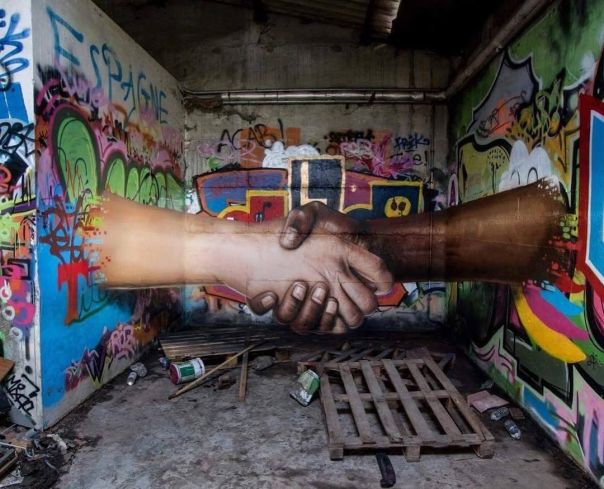At a BIC General conference, one of the speakers shared a memory. The church used to build a building where they wanted to have a congregation, then install a pastor and challenge him to fill it. “Building first” seemed like common sense to a lot of people — it still does. For instance, even before the Coordinators commissioned Jonny Rashid to lead Hive 2010, members of the formation team were already looking for prospective buildings — they still are.
Maybe it is in the American psyche to think, “If you build it, they will come” – that often makes sense to USonians; look at how Las Vegas gets people to trek out into a wasteland! Before people wanted to build a wall around it, people thought the whole country was built so freedom-loving capitalists from all over the world could come. We built it; they came! Maybe we all experience a little trickle-down empire building. Maybe we’re so materialistic, we end up thinking of ourselves as a destination. We don’t wait for someone to objectify us, we do it ourselves, “If I am fabulous some will love me,” or “If I am built, someone is sure to roll up my driveway.”
There are two huge problems with this mentality, one for mission and one for personal spiritual development.
The kingdom is not enshrined anywhere
On the mission side, Jesus followers need flexibility to do what needs to be done in the guerrilla war we are in against the domination system. The enslaving forces of the world never give up. Some Christians thought building fortress America for white Christians would spare them. But it has not been a great solution, since now so many Christians are in thrall to it! The kingdom of God is among us, not lodged in some building, or enshrined in some method.
Even Circle of Hope, which has some inbred incapacity that keeps us flexible, is having a difficult time, right now, turning itself into the stream of what God is doing next. We are doing it, but it is all too easy to live in what we built last decade.

We live to build
Same goes for the personal side. For many of us, once we get some faith established, we find our place in the community and we don’t have regular emotional breakdowns, we want to keep things stable. We’re built. We just try not to get unbuilt again. But the enslaving forces don’t give up. Sometimes we can be in denial so completely that we are like the last unremodeled house in a gentrified neighborhood – the world changed around us and we can’t figure out why it is so taxing to live in it.
I think we usually want to build it once, if we build anything at all, and see what comes. It can feel a little daunting to have worked so hard and then need to work hard some more. If one’s illusion is that “I am supposed to build my dream and then live in it,” it is very daunting to discover that is not all there is to it. But if one dreams about following Jesus, then there is the possibility of a lot more joy in store than just enjoying what you have built for yourself.
In Jesus, the work itself is about living, not about achieving a life. One doesn’t work in order to retire from working, one lives! One doesn’t build in order to get a life, one lives in order to build! Always being on a journey, and often being in something like a military campaign, can be tiring, but it is a pleasant fatigue. And the opposite of fighting alongside Jesus is a killer. Following after Jesus is a lot better than looking at everything you worked so hard to build and realizing that God doesn’t come to it anymore.
I have been thinking a lot about Jesus telling his detractors that “Before Abraham was, I am” (John 8). I long for all of us to have that sense of solidity as a people and as individuals — so that whether we have a place or build a place, we are, in Christ. When we are built firmly into Christ, we won’t be lost in building something to compete with the world and we won’t be unbuilt by the domination system coveting our personal property. We don’t need to build it so He will come; He came so we build.
Subscribe to Development! Hit the “follow” button after you type in your email. Thanks for reading!



